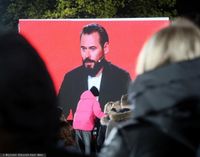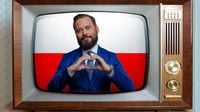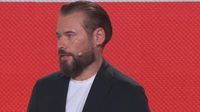Krzysztof Stanowski, a prominent journalist and founder of the YouTube channel Kanał Zero, has officially registered as a candidate for the 2025 Polish presidential election. Announcing his candidacy on April 11, 2025, Stanowski became the 13th individual to submit the required 100,000 signatures to the National Electoral Commission (PKW), having delivered them on April 4.
Born on July 21, 1982, in Warsaw, Stanowski has made a name for himself in the media industry, particularly through his work in the sports sector. His career began at the tender age of 14 when he interned at the "Przegląd Sportowy". He later covered significant events, including the 2002 FIFA World Cup in South Korea and Japan. Although he started a journalism degree, he did not complete it, citing his demanding career as a conflict.
Stanowski's motivation for running is not to win the presidency but to gain firsthand experience of the electoral process. He expressed this sentiment during a conversation with President Andrzej Duda on February 1, 2024, asking, "Do you advise me to run or not?" He further clarified his intentions on social media, stating, "I want to run in the presidential election, but that doesn’t mean I want to be the president of Poland. I just want to observe this circus and participate in debates."
His recent participation in a debate in Końskie showcased his unorthodox approach to politics. Stanowski did not hold back in criticizing his fellow candidates, emphasizing a shared lack of qualifications for the presidency. He remarked, "What connects me with most of my competitors is that I have no competence for this position. However, what divides us is that I can support myself in the labor market. I don’t need to be on your political payroll."
During the debate, Stanowski's responses often took an ironic tone. When asked about his foreign connections, he humorously quipped, "I know Marcin Gortat," referencing the Polish-American basketball player. This light-hearted remark contrasted sharply with the serious nature of the questions posed to him and his opponents.
Security issues were a significant topic during the debate. While other candidates discussed their views on mandatory military service, Stanowski took the opportunity to criticize the debate's organization, stating, "We had to force our way in here. Not all candidates are present, and it should not look like TVP is producing an event for one of the presidential candidates." His critique of the debate format highlighted his desire for a more inclusive political discourse.
Stanowski also pointed out inconsistencies in the statements made by his competitor, Rafał Trzaskowski, regarding border security and the migrant crisis. He stated, "Today, we got this version of Rafał Trzaskowski who is against allowing migrants in." This pointed observation underscored his commitment to holding candidates accountable for their policies and statements.
Further showcasing his candidacy's unconventional nature, Stanowski responded to a question about his first foreign visit by humorously stating it would be "Malta, the capital of the Maldives," a clear jab at the absurdity of political discussions surrounding international relations.
When given the chance to question fellow candidates, Stanowski directed a pointed inquiry at Maciej Maciak, asking, "Who are you?" This question, aimed at highlighting the often vague identities of political figures, resonated with the audience and showcased Stanowski's unique style.
His critique extended to the broader political landscape in Poland as well. During a discussion about transitioning away from coal, he remarked, "Poland can generate quarrels but cannot build a nuclear power plant," emphasizing the need for concrete action over political bickering.
As the election approaches, Stanowski's candidacy is drawing attention not only for its novelty but also for the fresh perspective he brings to the political arena. His blend of humor and sharp critique of the political establishment resonates with voters looking for authenticity in a crowded field of candidates.
While Stanowski may not be seeking the presidency for the sake of power, his campaign is becoming a platform for challenging the status quo and engaging voters in a dialogue about the future of Poland. His candidacy reflects a growing desire among some segments of the electorate for a break from traditional political norms and a call for more genuine engagement in the political process.
As the PKW continues to verify the signatures of other candidates, the political landscape in Poland remains dynamic and unpredictable. With Stanowski now officially in the race, the spotlight will undoubtedly be on how he navigates the complexities of the campaign and what impact his unique approach will have on the electorate.




